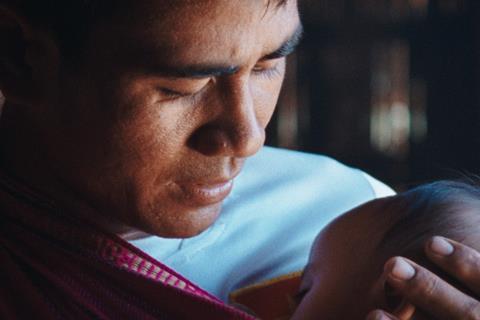Germany’s Franziska von Stenglin makes a strong feature debut with this documentary following a Vietnamese villager

Dir/scr: Franziska von Stenglin. Germany. 2021. 81mins
A gently persuasive exercise in exotic ethnography, The Dust Of Modern Life marks an auspicious feature-length debut for German writer-director Franziska von Stenglin. Following a Vietnamese villager before, during and after his annual jungle retreat—where he keeps alive the hunter-gatherer traditions handed down through the generations—this is a sumptous-looking immersion into a fascinating environment. It certainly ranks high among the world-premieres at this year’s FIDMarseille, despite being somewhat tucked away in the newcomers’ competition.
Becomes steadily more ambitious and poetic in its second half
Visually entrancing from first to last, the film is a testament to the skills of cinematographer Lucie Baudinaud and colour-grader Ronald Fliss, whose role in the successful transfer from Super16 to digital was clearly crucial. The team captures the myriad shades of green in the rainy Vietnamese countryside of the Central Highlands region with limpid richness and depth.
Opening title-cards introduce main protagonist Liêm, who is of the Sedang ethnicity. His annual jungle expedition is said to be imperilled—for reasons which never become clear in the ensuing 80-odd minutes. The importance of this expedition is evident from the seriousness with which it is planned; Liêm will be accompanied by three other adult males, but not by his young son Quang—the latter is told he can accompany his father “next year.” The quartet, who set off uphill with their supplies just after the half-hour mark, are thus able to fully escape their families for several days. There are shades of John Boorman’s Deliverance here – not that anything even slightly dramatic occurs during Liêm’s sojourn apart from the annoyance of intermittent heavy rain.
The sequences leading up to the men’s departure sketch in village life with sensitivity and economy, including a boisterous festival which (as has long been near-compulsory in rural documentaries) features the graphic slaughter of a large pig. This opening section also includes two breaks in the observational-chronicle format: the first is an interpolation of archival monochrome newsreel-style footage from the late 1960s, showing the day-to-day lives of the nation’s farmers during the Vietnam War accompanied by a rousingly upbeat, patriotic song of cheery, prickly anti-American defiance. The second, rather less successful, sees editors Marylou Vergez and Zuniel Kim alternate quickly between a festival dance performance and its slick equivalent on national television—an obvious point, made in heavy-handed fashion.
This is a rare misstep, however, for a film which becomes steadily more ambitious and poetic in its second half—the nature of the project itself drolly comes under discussion among the subjects. (“What we say will be recorded by their cameras, you know,” one cautions as they slog uphill in testing conditions.) Actual interactions between the filmers and the filmed are few and far between; however they do include one lovely little moment when one of Liêm’s group holds a tin-can lid to his eye as if the ringpull were a camera-viewfinder.
The latter stretches, with plentiful night-shooting and various bodies of water glimpsed amid the noises of insects and unseen critters, take impressionistic turns and impart a distinct, inescapable whiff of Apichatpong Weerasethakul. But despite treading some familiar thematic and geographic terrain, The Dust of Modern Life is thankfully very much its own beast, von Stenglin pulling off some simple but elegant visual/aural coups; sound-recordist Nguyễn Ngọc Tấn and sound-designer Christian Wittmoser excel. The final slow fade to black—the men apparently returning to their village on the back of a truck, as another cheerfully patriotic/military song is sung in the encroaching dark—is a resonant capper to a stealthily memorable and truly cinematic experience.
Production company: Punchline Cinéma
International sales: Punchline Cinéma, Paris (info@punchlinecinema.com)
Producers: Franziska von Stenglin, Lucas Tothe
Editing: Marylou Vergez, Zuniel Kim
Cinematography: Lucie Baudinaud







![The Brightest SunScreen[Courtesy HKIFF]](https://d1nslcd7m2225b.cloudfront.net/Pictures/274x183/3/5/0/1448350_thebrightestsunscreencourtesyhkiff_312678.jpg)














![The Brightest SunScreen[Courtesy HKIFF]](https://d1nslcd7m2225b.cloudfront.net/Pictures/100x67/3/5/0/1448350_thebrightestsunscreencourtesyhkiff_312678.jpg)

